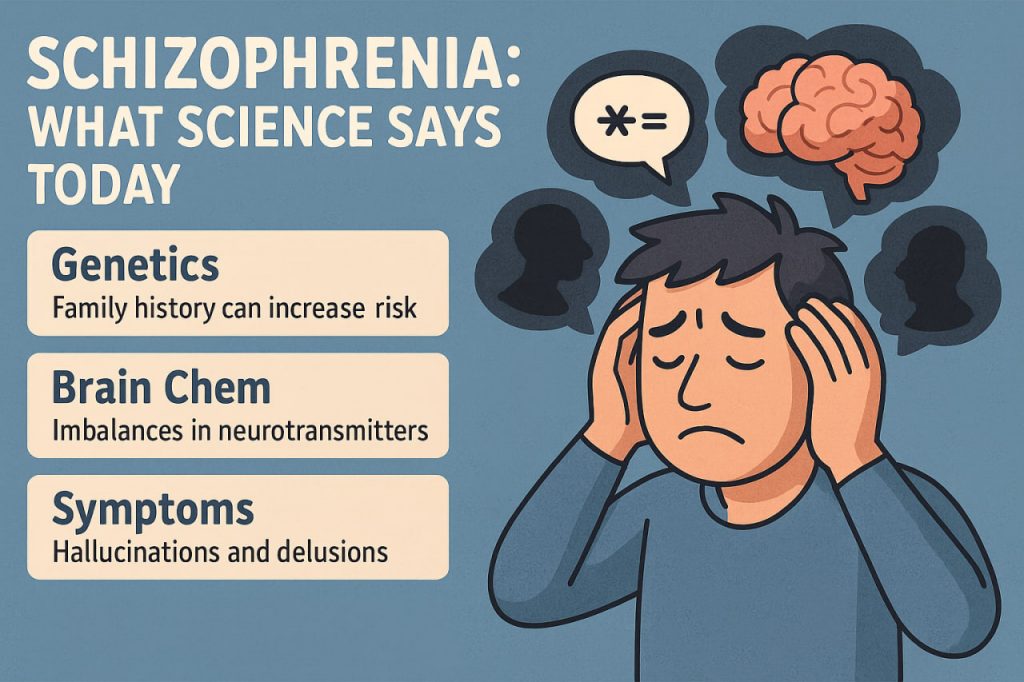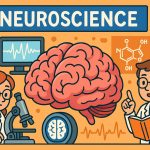Schizophrenia is a complex and chronic mental disorder that affects how a person thinks, feels, and behaves. People with this condition may have difficulty distinguishing between reality and imagination, which can interfere with daily life. Schizophrenia is not the same as having a “split personality,” a common misconception. Instead, it is a disorder that involves disruptions in thought processes, perception, and emotions. According to modern research, schizophrenia affects about 1% of the global population.
Causes and Risk Factors
Scientists now understand schizophrenia as the result of multiple interacting factors. Genetics play a strong role, with increased risk if close relatives are affected. Brain chemistry, particularly imbalances in neurotransmitters like dopamine and glutamate, is another key factor. Environmental influences such as prenatal infections, complications at birth, or traumatic experiences in adolescence may also contribute. However, no single cause explains all cases, which makes schizophrenia difficult to predict or prevent.
Symptoms and Diagnosis
The symptoms of schizophrenia are usually divided into three groups: positive, negative, and cognitive. Positive symptoms include hallucinations, delusions, and disorganized thinking. Negative symptoms involve loss of motivation, reduced emotional expression, and social withdrawal. Cognitive symptoms affect memory, attention, and problem-solving. Diagnosis requires careful psychiatric evaluation over time, since symptoms may overlap with other mental health conditions.
Modern Treatment Approaches
Treatment of schizophrenia has improved greatly in recent decades. Antipsychotic medications help control hallucinations and delusions, though they do not cure the disorder. Psychotherapy, cognitive-behavioral therapy (CBT), and family support are important in improving quality of life. Rehabilitation programs help patients build social and work skills. Importantly, self-medication is not advisable, as treatment must be personalized and monitored by professionals. With the right care, many people with schizophrenia can live independently and manage their symptoms.
Recent Advances in Research
Modern science is exploring new approaches to schizophrenia. Brain imaging studies reveal structural and functional differences in specific regions, such as the prefrontal cortex and hippocampus. Researchers are also studying the role of the immune system and inflammation in the disorder. Advances in genetics may one day allow earlier detection and more precise treatments. New medications targeting different neurotransmitters, as well as digital therapies and brain stimulation techniques, are currently being tested.
Social Challenges and Stigma
Despite scientific progress, people with schizophrenia often face stigma and misunderstanding. Misrepresentation in media has contributed to stereotypes that increase social isolation. Public education and awareness campaigns are helping to change these perceptions. Supporting individuals with schizophrenia requires not only medical care but also social acceptance and opportunities for integration. Reducing stigma remains a global challenge that science and society must address together.
Conclusion
Schizophrenia is a multifactorial mental disorder that science continues to study intensively. It involves genetic, biochemical, and environmental influences, with symptoms that affect thought, behavior, and emotions. Modern treatments help manage the condition, and ongoing research offers hope for more effective therapies in the future. By combining medical progress with social awareness, it is possible to improve the lives of people affected by schizophrenia and reduce the stigma surrounding the disorder.
Glossary
- Schizophrenia – a chronic mental disorder affecting thoughts, emotions, and behavior.
- Mental disorder – a condition that impacts mental health and daily functioning.
- Neurotransmitters – brain chemicals that transmit signals between nerve cells.
- Dopamine – a neurotransmitter involved in reward, motivation, and psychosis.
- Glutamate – a neurotransmitter linked to learning and memory, implicated in schizophrenia.
- Hallucinations – sensory experiences without external stimuli, such as hearing voices.
- Delusions – false beliefs resistant to logical explanation.
- Cognitive-behavioral therapy (CBT) – a type of psychotherapy focusing on changing thought and behavior patterns.


